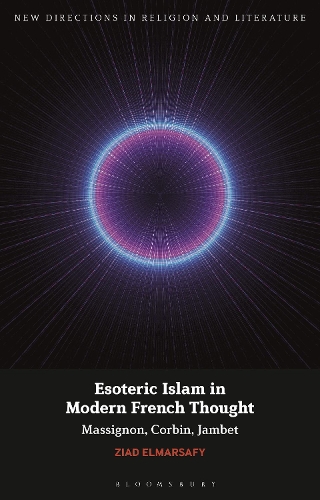
Esoteric Islam in Modern French Thought: Massignon, Corbin, Jambet
(Paperback)
Available Formats
Publishing Details
Esoteric Islam in Modern French Thought: Massignon, Corbin, Jambet
By (Author) Professor Ziad Elmarsafy
Bloomsbury Publishing PLC
Bloomsbury Academic
28th July 2022
United Kingdom
Classifications
Tertiary Education
Non Fiction
Literary studies: c 1900 to c 2000
297.071044
Physical Properties
Paperback
192
Width 138mm, Height 216mm
Description
Why would a devout Catholic, a committed Protestant, and a Maoist atheist devote their lives and work to the study of esoteric aspects of Islam How are these aspects good to think with What are the theoretical and intellectual problems to which they provide solutions These are the questions at the heart of Esoteric Islam in Modern French Thought. The three French specialists of Islam described above form an intellectual and personal genealogy that structures the core of the text: Massignon taught Corbin, who taught Jambet in his turn. Each of them found in the esoteric a solution to otherwise insurmountable problems: desire for Massignon, certainty for Corbin, and resurrection/immortality for Jambet. Over the course of three long chapters focused on the life and work of each writer, the book maps the central place of esoteric Islam in the intellectual life of twentieth and twenty-first century France.
Reviews
Elmarsafy provides extensive bio-bibliographical information and technical exegeses both in the body of the text and the rich footnotes, which will speak to specialists of Islam and Islamic mysticism. ... the book as a whole will interest scholars and advanced students already conversant in French theory who wish to deepen their knowledge. * Journal of Arabic Literature *
In this remarkable work, Ziad Elmarsafy re-opens the esoteric archive of modern French Islam. It requires a scholar of exceptional cultural, philosophical and linguistic range to even begin to do justice to Massignon, Corbin and Jambets work and Elmarsafy is that scholar. As he reconstructs the intellectual history of French engagements with esoteric Islam, Elmarsafy not only tells a story that has never properly been told before, but creates an entirely new genealogy of the evolution of modern French thought that forces us to re-pose classic questions about truth, subjectivity and freedom we thought we had already answered. Finally, and most importantly, however, this book beautifully exemplifies its own central argument about French esoteric Islam: Elmarsafys deeply affirmative readings of Massignon, Corbin and Jambet are distinguished throughout by the very intellectual hospitality or openness to the other that characterises their own engagements with the Islamic tradition. This is a major intellectual achievement by one of the most important scholars of comparative literature and thought working today and we are all in his debt. -- Arthur Bradley, Professor of Comparative Literature, Lancaster University, UK
Author Bio
Ziad Elmarsafy is Professor of Comparative Literature at Kings College London. His publications include Sufism in the Contemporary Arabic Novel (2012).
